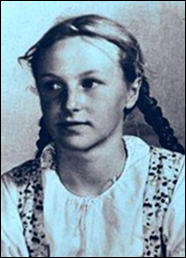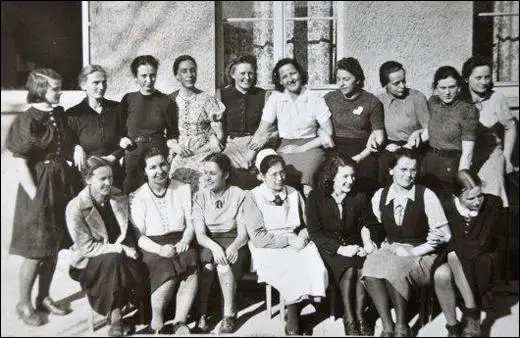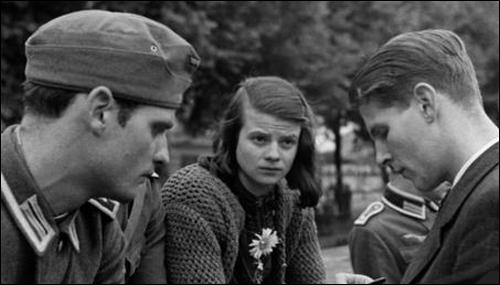Susanne Hirzel

Susanne Hirzel, daughter of the pastor Ernst Ulmer Hirzel, was born in Untersteinbach, Germany, on 7th August 1921. As a young girl she learnt to play the cello. She was described by Richard F. Hanser as being "blonde, pretty and pert". (1)
After the election of Adolf Hitler she joined the German League of Girls (BDM). Her group leader was Sophie Scholl. Hirzel later recalled: "I got to know Sophie Scholl when she was my group leader in the BDM. I admired her because of her eloquence and her behavior and she quickly became my very best friend. I often stayed at Sophie's parents' home and got to know her brother Hans and her sister Inge. The BDM was a scouting organization for girls. Political indoctrination was only one aspect among many others and I even became a troop leader (Scharführerin)." (2)
Sophie's father, Robert Scholl, was a strong opponent of the Nazi Party. Sophie's sister, Elisabeth Scholl later pointed out why they rejected their father's advice: "We just dismissed it: he's too old for this stuff, he doesn't understand. My father had a pacifist conviction and he championed that. That certainly played a role in our education. But we were all excited in the Hitler youth in Ulm, sometimes even with the Nazi leadership." (3)
Susanne Hirzel & Sophie Scholl
Susanne Hirzel was a regular visitor to the Scholl family home. Hans Scholl was a local leader of the Hitler Youth and was chosen to be the flag bearer when his unit attended the Nuremberg Rally in 1936. His sister, Inge Scholl, later recalled: "His joy was great. But when he returned, we could not believe our eyes. He looked tired and showed signs of a great disappointment. We did not expect any explanation from him, but gradually we found out that the image and model of the Hitler Youth which had been impressed upon him there was totally different from his own ideal... Hans underwent a remarkable change... This had nothing to do with Father's objections; he was able to close his ears to those. It was something else. The leaders had told him that his songs were not allowed... Why should he be forbidden to sing these songs that were so full of beauty? Merely because they had been created by other races?" (4)
Sophie Scholl was very close to Hans and she also became disillusioned with Adolf Hitler. Shortly after Hans returned from Nuremberg, an important BDM leader arrived from Stuttgart to conduct an evening of ideological training for the girls in Ulm. When the members were asked if they had any preferences for discussion, Sophie suggested they read poems by Heinrich Heine, one of her favourite writers. The leader was appalled and pointed out that the left-wing, anti-war, Jewish writer, had his books burned and banned by Propaganda Minister Joseph Goebbels in 1933. Apparently, Sophie replied, "Whoever doesn't know Heine, does not know German literature." (5)
Susanne Hirzel also became more critical of the Nazi government. She later claimed that Robert Scholl was an important factor in this. Scholl held liberal opinions and allowed his children to make their own choices. According to Richard F. Hanser: "They could say whatever they wished, and they all had opinions. This was far from customary practice in German households, where, by long tradition, the authority of the father was seldom questioned or his statements challenged... His aversion to mindless nationalism was not only unchanged but stronger than before. In his dinner-table discussions with his children, he could interpret events for them with an insight unblurred by current prejudices or official pronouncements." (6) Hirzel later recalled: "Sophie's father Robert Scholl was a determined Catholic pacifist and a sincere Christian. He told us about his experiences and that influenced my thinking." (7)

Sophie Scholl developed a strong hatred of the Nazi government. She told Hirzel: "If Hitler came walking by right now and I had a pistol, I would shoot. If the men don't do it, then a woman will have to. You have to do something to avoid being guilty yourself." (8) Sophie went to university but Susanne Hirzel went to study music in Stuttgart. (9)
White Rose Group
In 1942 a group of students at the University of Munich established the White Rose group. It included Hans Scholl, Sophie Scholl, Christoph Probst, Alexander Schmorell, Willi Graf, and Jugen Wittenstein. According to Elisabeth Scholl, the White Rose group was formed because of the execution of members of the resistance: "We learned in the spring of 1942 of the arrest and execution of 10 or 12 Communists. And my brother said, In the name of civic and Christian courage something must be done.” (10)
Hans Scholl soon emerged as the group's leader: "The role was tacitly bestowed on him by virtue of that quality in his personality that, in any group, made him the focus of attention. Alex Schmorell was usually at his side, his close collaborator. Between them, they arranged for meetings and meeting places.... Sometimes they met in Hans' room for impromptu talk and discussion. For larger meetings, they gathered at the Eickemeyer studio or the villa of Dr. Schmorell, an indulgent father who shared many of his son's views." (11)
In June 1942 the White Rose group began producing leaflets. They were typed single-spaced on both sides of a sheet of paper, duplicated, folded into envelopes with neatly typed names and addresses, and mailed as printed matter to people all over Munich. At least a couple of hundred were handed into the Gestapo. It soon became clear that most of the leaflets were received by academics, civil servants, restaurateurs and publicans. A small number were scattered around the University of Munich campus. As a result the authorities immediately suspected that students had produced the leaflets. (12)
The opening paragraph of the first leaflet said: "Nothing is so unworthy of a civilized nation as allowing itself to be "governed" without opposition by an irresponsible clique that has yielded to base instinct. It is certain that today every honest German is ashamed of his government. Who among us has any conception of the dimensions of shame that will befall us and our children when one day the veil has fallen from our eyes and the most horrible of crimes - crimes that infinitely outdistance every human measure-reach the light of day? If the German people are already so corrupted and spiritually crushed that they do not raise a hand, frivolously trusting in a questionable faith in lawful order in history; if they surrender man's highest principle, that which raises him above all other God's creatures, his free will; if they abandon the will to take decisive action and turn the wheel of history and thus subject it to their own rational decision; if they are so devoid of all individuality, have already gone so far along the road toward turning into a spiritless and cowardly mass - then, yes, they deserve their downfall." (13)
The White Rose group recruited student sympathizers to help distribute these leaflets. Susanne and her brother Hans Hirzel, agreed to help them be delivered in Ulm. They also persuaded their friends, Franz Müller and Heinrich Guter to help. Traute Lafrenz, Gisela Schertling and Katharina Schüddekopf also became part of the network. (14) Susanne Hirzel later recalled: "We all were oppositional patriots, but with a Christian understanding. Although the Scholls were Catholic and I was Protestant (my father was a Lutheran parish priest), we shared almost everything in common." (15)
In January, 1943, the White Rose group produced a leaflet, entitled A Call to All Germans!, included the following passage: "Germans! Do you and your children want to suffer the same fate that befell the Jews? Do you want to be judged by the same standards as your traducers? Are we do be forever the nation which is hated and rejected by all mankind? No. Dissociate yourselves from National Socialist gangsterism. Prove by your deeds that you think otherwise. A new war of liberation is about to begin."
It ended with the kind of world they wanted after the war finished: "Imperialistic designs for power, regardless from which side they come, must be neutralized for all time... All centralized power, like that exercised by the Prussian state in Germany and in Europe, must be eliminated... The coming Germany must be federalistic. The working class must be liberated from its degraded conditions of slavery by a reasonable form of socialism... Freedom of speech, freedom of religion, the protection of individual citizens from the arbitrary will of criminal regimes of violence - these will be the bases of the New Europe." (16)

The Gestapo later estimated that the White Rose group distributed around 10,000 copies of this leaflet. Sophie Scholl and Traute Lafrenz purchased the special paper needed, as well as the envelopes and stamps from a large number of shops to avoid suspicion. Each leaflet was turned out one by one, night after night. "In order to stay awake and to function during the day, they took pep pills from the military clinics where the medics worked." (17) The conspirators had to ensure that the Gestapo could not trace the source to Munich so the group had to post their leaflets from neighbouring towns." (18)
The authorities took this leaflet more seriously than the others. One of the Gestapo's most experienced agents, Robert Mohr, was ordered to carry out a full investigation into the group called the "Resistance Movement in Germany". He was told "the leaflets were creating the greatest disturbance at the highest levels of the Party and the State". Mohr was especially concerned by the leaflets simultaneous appearance in widely separated cities including Stuttgart, Vienna, Ulm, Frankfurt, Linz, Salzburg and Augsburg. This suggested an organization of considerable size was at work, one with capable leadership and considerable resources. (19)
Arrest & Execution of Sophie Scholl
On 18th February, 1943, Sophie and Hans Scholl arrived at the University of Munich with a suitcase packed with leaflets. According to Inge Scholl: "They arrived at the university, and since the lecture rooms were to open in a few minutes, they quickly decided to deposit the leaflets in the corridors. Then they disposed of the remainder by letting the sheets fall from the top level of the staircase down into the entrance hall. Relieved, they were about to go, but a pair of eyes had spotted them. It was as if these eyes (they belonged to the building superintendent) had been detached from the being of their owner and turned into automatic spyglasses of the dictatorship. The doors of the building were immediately locked, and the fate of brother and sister was sealed." (20)
Jakob Schmid, a member of the Nazi Party, saw them at the University of Munich, throwing leaflets from a window of the third floor into the courtyard below. He immediately told the Gestapo and they were both arrested. They were searched and the police found a handwritten draft of another leaflet. This they matched to a letter in Scholl's flat that had been signed by Christoph Probst. Following interrogation, they were all charged with treason. (21)
Sophie Scholl, Hans Scholl and Christoph Probst were all tried for high treason on 22nd February, 1943. They were all found guilty. Judge Roland Freisler told the court: "The accused have by means of leaflets in a time of war called for the sabotage of the war effort and armaments and for the overthrow of the National Socialist way of life of our people, have propagated defeatist ideas, and have most vulgarly defamed the Führer, thereby giving aid to the enemy of the Reich and weakening the armed security of the nation. On this account they are to be punished by death. Their honour and rights as citizens are forfeited for all time." (22) They were all executed later that day. (23)
Susanne Hirzel was arrested and put on trial on 19th April, 1943. She later claimed that she expected to be executed. (24) She told the court that her brother Hans Hirzel, had asked her to post the leaflets. As they were in the envelopes she claimed that she did not know the content of the leaflets. Judge Freisler said she gave the impression of candor and did not know her brother was engaged in treasonous activity. She was sentenced six months in prison. Her brother got five years. Alexander Schmorell, Kurt Huber and Willi Graf were all found guilty of high treason and executed. (25)
After the war Susanne Hirzel was a cello teacher. In her retirement she published her memories of life in Nazi Germany, in her book, From Yes to No. A Swabian Youth 1933-1945 (2000).
Susanne Hirzel died on 4th December, 2012.
Primary Sources
(1) Susanne Hirzel, The New English Review (October, 2009)
I got to know Sophie Scholl when she was my group leader in the BDM. I admired her because of her eloquence and her behavior and she quickly became my very best friend. I often stayed at Sophie's parents' home and got to know her brother Hans and her sister Inge. The BDM was a scouting organization for girls. Political indoctrination was only one aspect among many others and I even became a troop leader(Scharführerin). Sophie's father Robert Scholl was a determined Catholic pacifist and a sincere Christian. He told us about his experiences and that influenced my thinking. At that time, we jointly decided that we should do something against Hitler.
(2) Judge Roland Freisler, court transcript (19th April, 1943)
Susanne Hirzel attended the music school in Stuttgart; she worked hard and made good progress in her studies. She was always a decent girl, raised at home to support the state, and was given a proper upbringing suited to a woman.
Unexpectedly her favorite brother Hans called her one day, arranged to meet her in town, and told her that he was coming without their parents' knowledge and that he had "letters" to mail. He was not in agreement with their contents, but there could be no harm in mailing them. Now she suspected, naturally, that there was something amiss, but she did not check over their contents, and she helped him post the "letters".Susanne Hirzel gives an impression of candor. The Court believes her when she says that she did not discover that her brother was engaged in treasonous activity. But it was inexcusable that she did not investigate further to check the actual contents of the package with the several hundred "letters," with their supposedly harmless internalpolitical content. Such would have been her duty.
Student Activities
The Political Development of Sophie Scholl (Answer Commentary)
The White Rose Anti-Nazi Group (Answer Commentary)
Kristallnacht (Answer Commentary)
Adolf Hitler's Early Life (Answer Commentary)
Heinrich Himmler and the SS (Answer Commentary)
Trade Unions in Nazi Germany (Answer Commentary)
Adolf Hitler v John Heartfield (Answer Commentary)
Hitler's Volkswagen (The People's Car) (Answer Commentary)
Women in Nazi Germany (Answer Commentary)
German League of Girls (Answer Commentary)
